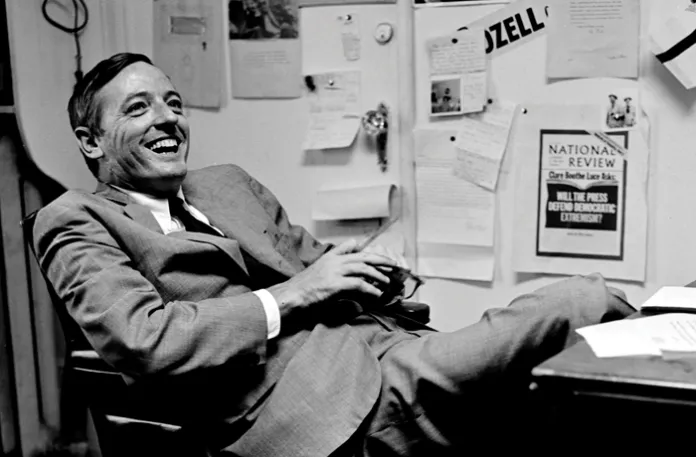Nov. 24 was the 100th anniversary of William F. Buckley Jr.’s birth. Even though he has been gone for more than a decade and a half, the impact of his life is still being felt today. In his efforts to forge a consequential movement, Buckley worked to “police the Right,” expelling antisemites and conspiracy theorists from the movement he created. It was a role he maintained throughout his six decades in politics. The centenary of his birth makes this a worthwhile time to remember why this was important in the past — and why it isn’t happening now.
Buckley’s first police action was with respect to the magazine he himself controlled. He barred antisemites from appearing in National Review. As he later wrote about this effort, “When it became clear, in 1957, that the direction the American Mercury was headed was anti-Semitic, I ruled, with the enthusiastic approval of my colleagues, that no writer appearing on the Mercury’s masthead, notwithstanding his own innocence on the subject, could also appear on National Review’s.”
Because National Review was his magazine, Buckley had the power to shape it to his liking. In 1962, though, he took a bigger and broader step with his National Review article, “The Question of Robert Welch.” Welch was the founder of the John Birch Society, a conspiratorialist whose views threatened to make conservatism unpalatable and Republicans unelectable. Even though Buckley had a relationship with Welch, he was willing to call Welch out in the service of protecting the conservative movement. According to Buckley, Welch’s belief that Dwight Eisenhower, Secretary of State John Dulles, and Central Intelligence Director Allen Dulles were all communists was “so far removed from common sense.”

Then, as now, there were questions of whether it was appropriate for a conservative to criticize someone else who, problematic as they may be, was situated on the right side of the political spectrum. Buckley acknowledged this argument but also explained why it was wanting. As Buckley wrote, “If not a single criticism had been made of Mr. Welch, by the Liberal press, the dilemma would exist just the same, and conservatives sooner or later would have to face it.” Buckley understood that conservatives had a responsibility that went beyond party, that went beyond a certain specific election, and that applied to protecting not just America but Western civilization itself. As Buckley wrote, “The underlying problem is whether conservatives can continue to acquiesce tacitly in a rendition of the causes of the decline of the Republic and the entire Western world which is false, and besides that, crucially different in practical emphasis from their own.”
Buckley had some sympathy for individual members of the John Birch Society, noting that they include “some of the most morally energetic, self-sacrificing, and dedicated anti-Communists in America.” But sympathy for certain members did not mean that one should indulge Welch’s paranoia and conspiratorial thinking. Good people can be directed by bad leaders, and it is important to call out those leaders for their misbehavior. It may be true, as historian Matthew Dallek has written, that “no single conservative leader had the power to ‘excommunicate’ the Birch Society,” but Buckley’s essay went a long way toward delegitimizing it and diminishing its influence on the right.
In 1991, Buckley intervened once again. Faced with discomfiting manifestations of antisemitism on the Right from both National Review‘s Joseph Sobran and the conservative columnist and presidential aspirant Pat Buchanan, Buckley wrote a 40,000-word essay, “In Search of Anti-Semitism,” in the Dec. 30, 1991, issue of National Review. Before writing it, however, he had spoken privately to Sobran, whose career he had initiated and cultivated. He had also prohibited Sobran from writing about Jews or Israel in National Review. But the essay represented an official break from Sobran and his odious views. Doing this was personally difficult. Sobran was a friend, but Buckley viewed his role as guardian for the conservative movement as more important than personal friendships. Buckley was somewhat less condemnatory of Buchanan but determined that he had engaged in antisemitic rhetoric as well: “I find it impossible to defend Pat Buchanan against the charge that what he did and said during the period under examination amounted to anti-Semitism.” Buckley’s efforts did not expurgate antisemitism completely — nothing could — but they made clear that he would not tolerate it on the respectable Right.

As the current controversy surrounding Heritage Foundation President Kevin Roberts’s defense of Tucker Carlson shows, what Buckley did was not easy. Roberts’s ill-considered statement that “we will always defend our friends” is precisely the opposite of the Buckley approach. It was because Buchanan and Sobran were his friends that Buckley’s denunciation of their antisemitism was so powerful.
The problem that conservatism has today is that the organizations or people with the stature to step into the breach may not be fully up to the task. Buckley could serve as a gatekeeper because gates existed at the time. It was hard to be considered a member of the Right if you had no access to National Review. There were only a handful of conservative magazines, and National Review was the most highly regarded among them. It was taken seriously outside the conservative world as well. Today, there are so many sites that any crackpot can publish anything, anywhere from X to Substack to TikTok and more. Gatekeeping can only go so far in this environment, raising the issue of what entities could help police conservatism as Buckley once did.
Establishment entities such as Harvard University and the New York Times have no credibility with conservatives and have no useful role to play here. On the Right, Buckley’s own home of National Review is not what it once was. National Review tried to declare Donald Trump out of bounds in 2016 and failed in that effort. Any subsequent attempts would lead some to say that National Review tried to keep Trump out, and he’s now been the standard-bearer of the Republican Party for three straight election cycles.
That brings us to the think tanks, which is why the blowup at Heritage was so disturbing. For decades, the Heritage Foundation served as the voice of the mainstream conservative. You might not agree with its positions, but going to its website told you what the consensus conservative position was on many an issue. That is no longer the case, and the recent controversy over there means that it will not have the credibility to serve as a gatekeeper on issues of antisemitism at a minimum. Other think tanks, such as the American Enterprise Institute, don’t have a one-voice policy, like Heritage, so they can’t declare which positions are in and out of bounds.
One possible gatekeeper is the well-regarded Wall Street Journal’s editorial page. It already does serve this function among mainstream conservatives. Unfortunately, it is not as revered among the MAGA crowd, which is precisely where this kind of policing is required. Another Rupert Murdoch entity, Fox News, could have a role to play, but it focuses more on telegenic guests and strong ratings than about sanitizing problematic views on the Right.
Then there are the politicians. Trump has the ability to destroy people within the Republican Party, but his interest has been more personal and transactional than idea-oriented. Unlike Buckley, his motivation is not protecting the conservative movement so much as advancing himself. Other politicians are seen too much as interested parties, many of them looking to replace Trump or bolster their own positions. Retired politicians such as former President George W. Bush have credibility in some circles, but not across the entirety of the conservative spectrum.
MYSTERIES OF THE EAST (WING)
Buckley had an advantage over all these players. He wasn’t out to make a buck: He once noted that National Review had lost $25 million over 50 years, joking that the annual $500,000 losses were “about the cost of one-third of one torpedo.” And he didn’t have dreams of electoral office, except for his 1965 run for mayor of New York — even then, he famously quipped that if he won, he’d “demand a recount.” What Buckley wanted to do was build a movement with intellectual and ethical credibility — the true foundation for lasting impact. That required the moral courage to stand up to malevolent and misleading. He took that role upon his shoulders, not for profit or for political gain, but for the sake of the conservative movement that he believed was essential for America. Before Buckley, conservatism could be dismissed, as Lionel Trilling famously did in 1950, as “irritable mental gestures which seek to resemble ideas.” After Buckley, such dismissals were no longer plausible.
What Buckley did was really hard. A different technological environment helped, as did the fact that the movement was smaller at the time. But the fact that Buckley did it and for such a long time helped make the conservative movement a respectable part of the American political discourse. If conservatives want to maintain that respectability — and I recognize that certain quarters do not — we are going to have to figure out how to do some self-policing without the skillful hand and good heart of William F. Buckley Jr. to guide us.
Washington Examiner magazine contributor Tevi Troy is a senior fellow at the Ronald Reagan Institute, a senior scholar at Yeshiva University’s Straus Center, and the author of five books on the presidency.
